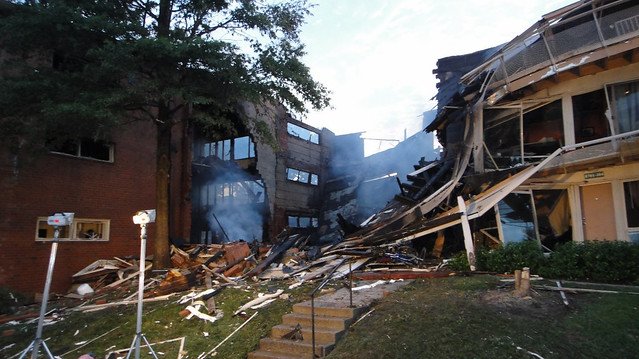NTSB: Utility’s Faulty Equipment is Source of Deadly 2016 MD Explosion
A gas utility’s faulty equipment was the source of a fatal explosion at the Flower Branch apartment complex in Silver Spring, MD in 2016, the National Transportation Safety Board (NTSB) has determined according to a report released this week.
The NTSB is an independent federal investigative agency responsible for investigating aviation, marine, pipeline and surface transportation accidents. The agency’s report, released this week, states that the source of the fatal explosion was an unconnected vent line on an indoor mercury service regulator. The lack of connection led to a buildup of gas which then exploded.
The report found that the explosion could have been prevented if a service technician had entered the meter room and remedied the faulty connection. And that the explosion would not have occurred if the mercury service regulators been located outside the building. It also found that gas odorants alone aren’t enough to sufficiently warn people of a gas leak.

NTSB photo: This front view of the accident scene shows two explosion-damaged buildings on Arliss Street, Silver Spring, Maryland. Building 8701 is located at the right center and building 8703 is located at the left of the photograph. Some smoke is seen at the accident scene
2016 Flower Branch Apartment Explosion
On August 10, 2016, an explosion at the Flower Branch apartment complex injured 68 people, killing seven of them. At the time, residents told local media that they smelled gas before the explosion. According to the NTSB report, Washington Gas had been notified of a gas odor two weeks before the explosion, but not on the day of.
When firefighters responded to the July 25, 2016 call about a gas odor, they were unable to enter the meter room -where the smell was likely coming from. County code requires that firefighters have access to such areas, but the locks on the door had recently been changed. Because they did not, could not enter the meter room, they did not detect the source of the leak and call Washington Gas, nor did the 911 dispatcher.
Safety Recommendations
Based on its findings, the NTSB made several safety recommendations including that:
-A requirement that all new service regulators be installed outside occupied structures
-Exiting interior regulators be relocated outside whenever the gas service line, meter, or regulator is replaced.
-911 operators automatically notify the gas company whenever there is a call about a gas odor.
– Require all types of residential occupancies with gas service have methane detection systems.
Gas Explosion Lawyers
The gas explosion lawyers at Pritzker Hageman represent clients nationwide who have been injured in explosions and those who have suffered the wrongful death of a loved one. For a free consultation, call them at 1 (888) 377-8900, text them at 612-261-0856 or use the contact form below.


